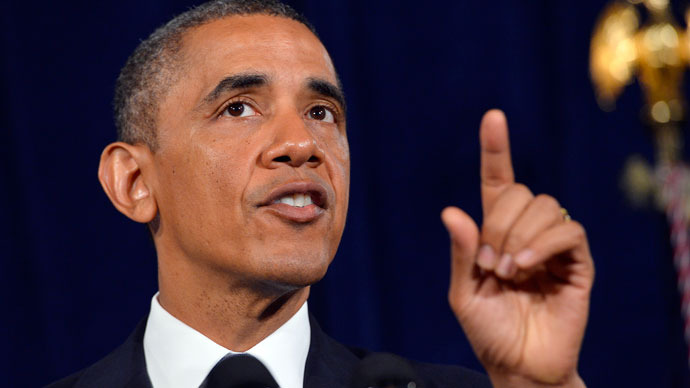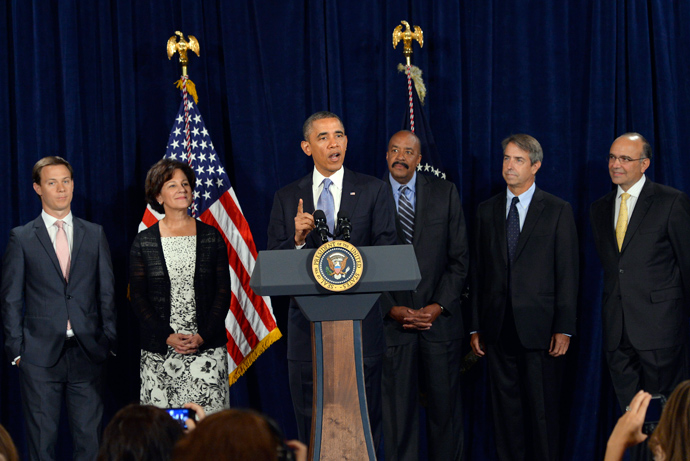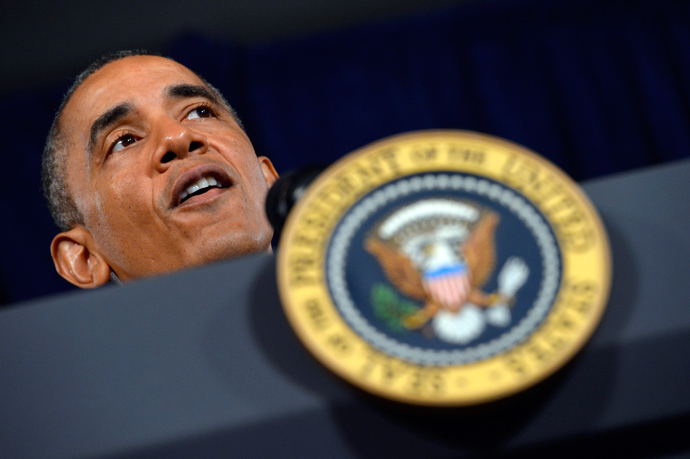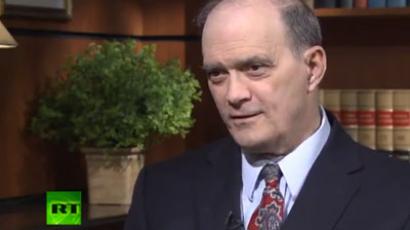Obama on NSA surveillance: Can't have 100% security and 100% privacy

The NSA’s extensive spying program is justified as it allows agents to identify “leads with respect to folks who might engage in terrorism,” claimed US President Barack Obama, adding that no one promised Americans both total security and total privacy.
Obama weighed in Friday morning on an evolving series of scandals surrounding an apparent National Security Agency program designed to allow real-time online surveillance of US citizens.
Obama was concluding remarks about his Affordable Health Care Act during an address in Northern California Friday morning when he fielded a single question about the NSA and the recently disclosed domestic spying programs.
“I think it’s important to recognize that you can’t have 100 per cent security and also then have 100 per cent privacy and zero inconvenience,” the president told the crowd while delivering several minutes of unscripted remarks about the NSA.
Earlier this week, civil liberties-focused lawyer-turned-journalist Glenn Greenwald of The Guardian published a document disclosing that the NSA orders the phone records of millions of American subscribers on a regular basis, and that American telecom firms have been compelled to provide the US government with numbers dialed, duration of call and other metadata.
One day later, The Guardian and the Washington Post nearly simultaneously disclosed a program named PRISM. According to Greenwald, PRISM allows the NSA to connect directly to data servers controlled by the biggest names on the Web, essentially providing Uncle Sam with backdoor access to the bulk of the country’s communications.
“The National Security Agency has obtained direct access to the systems of Google, Facebook, Apple and other US internet giants, according to a top secret document obtained by the Guardian,” Greenwald wrote late Thursday.

Obama dismissed allegations that both NSA programs have been spying on Americans, instead calling them critical aspects of the country’s continuously expanding counterterrorism efforts. He also rejected the notion that the programs are as vast in scope as has been reported, at the same time shifting blame away from his administration and towards the lawmakers he said have been privy to both operations every step of the way.
“The programs,” said Obama, “are secret in the sense that they are classified, but they are not secret in the sense that when it comes to telephone calls, every member of Congress has been briefed on this program.”
“With respect to all of these programs, the relevant intelligence committees are fully briefed on these programs. These are programs that have been authorized by broad bipartisan majorities repeatedly since 2006. And so I think at the onset it is important to understand that your duly elected representatives have been consistently informed on exactly what we’re doing,” insisted Obama.
“When it comes to telephone calls, nobody is listening to your telephone calls. That’s not what this program was about. As indicated, what the intelligence community is doing is looking at phone numbers and durations of calls. They are not looking at people’s names and they are not looking at content. But, by sifting through this so-called metadata, they may identify potential leads with respect to folks who might engage in terrorism,” he said.
In regards to PRISM, Obama also downplayed reports of a widespread domestic surveillance operation.
“With respect to the Internet and emails, this does not apply to US citizens and it does not apply to people living in the United States,” he said. “And again in this instance, not only is Congress fully appraised of it, but what is also true is that the FISA [Foreign Intelligence Surveillance Act] court has to authorize it.”
Congress reauthorized FISA last year, giving federal investigators another five-year window to wiretap the communications of Americans citizens if one of the parties involved is thought to be outside of the US. Google began publishing statistics about FISA's court-penned requests for user data in recent months, but the actual scope of the government’s spying prowess has gone unreported. Last year, two members of Congress even wrote the NSA for a rough estimate of how many Americans were having their communications intercepted — a request which was refuted.

“What you've got is two programs that were originally authorized by Congress, had been repeatedly authorized by Congress; bipartisan majorities have approved of them – Congress is continually briefed on how they are conducted. There is a whole range of safeguards involved, and federal judges are overseeing the entire program throughout,” Obama said.
Obama also suggested that under former president George W. Bush, discussions of the programs might never have surfaced. “Five years ago, six years ago, we might not have been having this debate,” he said, calling the discourse an example of “maturity.”
That didn’t keep Obama from condoning the leaked reports, though, and he made sure to speak in that connection as well.
“I don’t welcome leaks, because there are a reason these programs are classified,” Obama said. “I think that there is a suggestion that somehow any classified program is a quote-unquote ‘secret program,’ which means it is somehow suspicious. But the fact of the matter is in our modern history, there are a whole range of programs that have been classified, because when it comes to, for example, fighting terrorism, our goal is to stop folks from doing us harm. And if every step that we are taking to try to prevent a terrorist act is on the front page of the newspapers or any television, then presumably the people that are tying to do us harm are going to be able to get around our preventative measures. That’s why these things are classified. But that’s also why we set up congressional oversight. These are the folks that you all vote for as your representatives in Congress, and they are being fully briefed on these programs.”
“In the abstract you can complain about Big Brother and how this is a potential program run amok, but when you actually look at the details then I think we’ve struck the right balance,” he said.
The White House had failed to respond directly to The Guardian and Washington Post articles before the comments in California. He is currently traveling in the state and plans to meet with the president of China there this weekend.
Obama said he would continue to take questions through the week.














